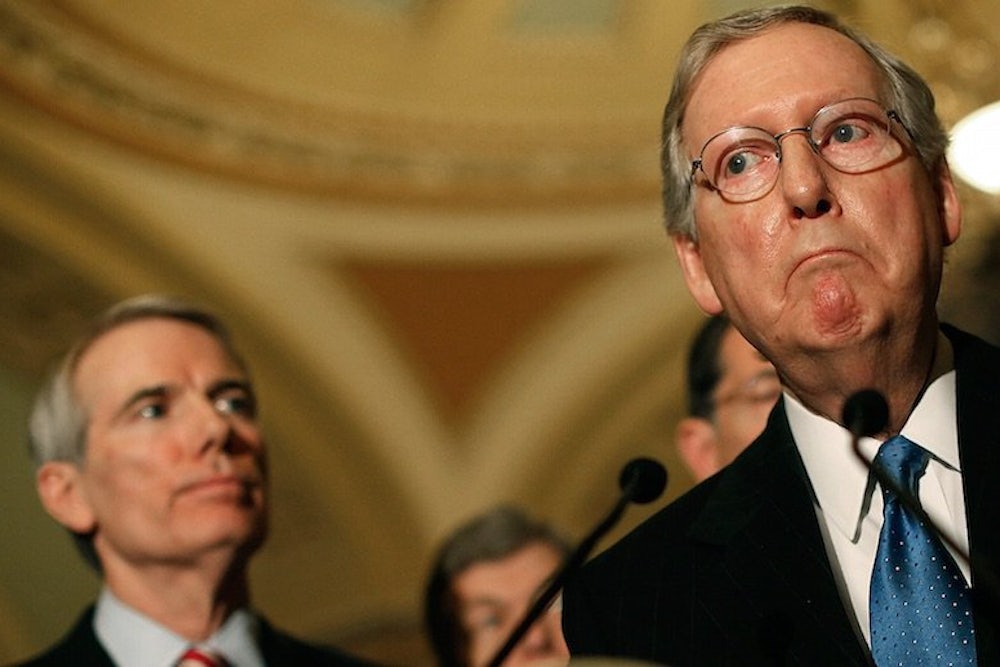The day after Democrats lost the Senate, and handed the Republican Party its largest House majority in nearly a century, President Barack Obama stood at a podium in the East Room of the White House and radiated something just short of defiance.
Nonplussed conservatives weren’t sure whether to be annoyed or thrilled—if Obama didn’t see danger for his party in the previous night’s returns, maybe he was stuck in the kind of bubble that cost Mitt Romney the presidency in 2012, and would weaken the Democratic position ahead of the next general election.
But Obama’s demeanor was rooted in two insights: first, the truism that midterm elections, and particularly the one just past, favor Republicans in a structural way; second, that an ongoing, durable burst of economic growth would eventually strengthen his political hand—perhaps to the point where Republicans could no longer afford to bat him about like a piñata without suffering at a national level.
Two and a half months later, Obama was able to deliver a victorious State of the Union address to a room dominated by Republicans, and the viewing public loved it. Under the circumstances, conservatives are no longer nonplussed. They’re pouting.
Obama, “almost without exception indicated he’s not for much of anything the American people voted for last November,” a frustrated Senate Majority Leader Mitch McConnell told reporters.
“It’s interesting, to put it mildly, that the president should so resolutely ignore these results,” John Podhoretz wrote in the New York Post.
In a column for the Washington Examiner, Byron York complained that “Obama never once acknowledged that there was a big election in November and that the leadership of the Senate has changed.” He added:
Obama’s silence on that political reality, stood in stark contrast to George W. Bush’s 2007 State of the Union address, in which he graciously and at some length acknowledged the Democrats’ victory in the 2006 midterms. Bush said it was an honor to address Nancy Pelosi as "Madam Speaker." He spoke of the pride Pelosi’s late father would have felt to see his daughter lead the House. "I congratulate the new Democrat majority," Bush said. “Congress has changed, but not our responsibilities.” If one cannot imagine Obama saying such a thing — well, he didn’t.
One of the defining ceremonial features of State of the Union addresses is that the president speaks while flanked by constitutional officers. The House speaker, seated above the rostrum, next to the president of the Senate (i.e. Joe Biden, not Mitch McConnell), introduces the president of the United States, ahead of his remarks. That’s why in 2011, Obama congratulated the “new Speaker, John Boehner,” and celebrated him as the embodiment of the American dream, in which “someone who began by sweeping the floors of his father’s Cincinnati bar can preside as speaker of the House in the greatest nation on Earth.”
So, yes, one can imagine Obama saying such a thing, and he would have said such a thing to Mitch McConnell—the mastermind of the unrivaled political opposition Obama has faced—had McConnell been a participant in the ceremony.
But if Obama was less chastened last night than George W. Bush in 2007, or than Republicans would’ve preferred, it’s because the political climate Obama faces today isn’t identical to the one Bush faced back then. And Republicans are themselves in part to blame.
Obama’s approval ratings have ticked up since November and held in the mid to high 40s, hitting 50 in at least one poll. In late January 2007, George W. Bush’s approvals were mired in the mid-to-low 30s.
With Bush on his heels, Democrats in Congress passed a raft of real legislation and took the domestic agenda out of his hands. That burst of activity was ongoing as Bush delivered his remarks. Republicans can’t do anything about the fact that Obama is more popular now than Bush was then, or that he's using that added support to advance his own agenda from within the executive. But they could try to rival him with a thoroughgoing legislative agenda of their own. Instead, they've fixated on the Keystone pipeline and retrogressive assaults on bills Obama signed years ago.
An election has lasting effects, because it alters the balance of power for more than a day, but to an important extent it’s also a snapshot of a political moment. The only strange thing about the reversal we’ve just witnessed is how quickly it occurred, not that it occurred at all. Obama learned all this years ago, thanks in large part (ironically) to Mitch McConnell, and the conservative pundits who applauded Republicans in 2009 as they paid no heed to the election results. Nobody should have a greater appreciation for Obama’s determination in defeat, and the dividends it's paid, than they.
